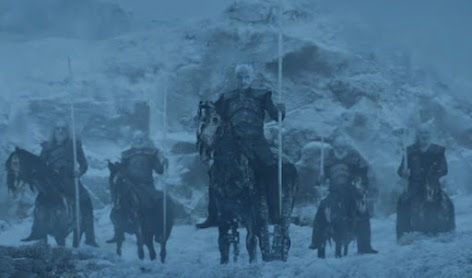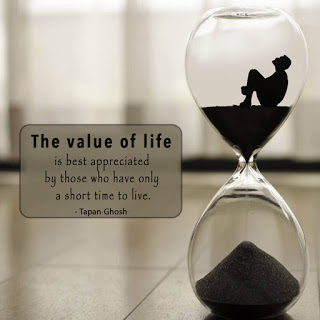“Winter Is Coming”, Part 3
by Jim Quinn
“Summer will end soon enough, and childhood as well.”
– George R.R. Martin, "Game of Thrones"
“The very survival of the nation will feel at stake. Sometime before the year 2025, America will pass through a great gate in history, commensurate with the American Revolution, Civil War,and twin emergencies of the Great Depression and World War II.”– Strauss & Howe, “The Fourth Turning”
“Reflect on what happens when a terrible winter blizzard strikes. You hear the weather warning but probably fail to act on it. The sky darkens. Then the storm hits with full fury, and the air is a howling whiteness. One by one, your links to the machine age break down. Electricity flickers out, cutting off the TV. Batteries fade, cutting off the radio. Phones go dead. Roads become impassible, and cars get stuck. Food supplies dwindle. Day to day vestiges of modern civilization – bank machines, mutual funds, mass retailers, computers, satellites, airplanes, governments – all recede into irrelevance.
Picture yourself and your loved ones in the midst of a howling blizzard that lasts several years. Think about what you would need, who could help you, and why your fate might matter to anybody other than yourself. That is how to plan for a saecular winter. Don’t think you can escape the Fourth Turning. History warns that a Crisis will reshape the basic social and economic environment that you now take for granted.”– Strauss & Howe, "The Fourth Turning"
“In Part One of this article I laid out the reasons for Gray Champions arising to meet challenges during crisis periods in history. In Part Two of this article I assessed the configuration of Gray Champions throughout the world and the potential impact on the course of this Fourth Turning.
The swirling fog of confusion enveloping the globe as the high lords of the universe play their game of thrones has even the most critical thinking individuals baffled by the course of events. The desperation and blatant lawlessness of the Deep State players in their endeavor to preserve their hegemony over the course of global affairs is palpable with every attack, false flag, accusation, and ratcheting up of their propaganda media machine.
Like “Game of Thrones,” the behind the scenes machinations, subterfuge, and deceptions taking place outside the purview of the common folk are designed to only benefit the rich and powerful players undertaking these traitorous actions. Open warfare will not happen until it is thought to be in the best interests of those manipulating the levers of society and the narrative produced by their perpetual propaganda media machine. But, in the end, it will be the innocent common people who will suffer the consequences, while the lords reap the riches, glory and power.
“Why is it always the innocents who suffer most,
when you high lords play your game of thrones?”
– “Lord Varys”,
- George R.R. Martin, “Game of Thrones”
The common people have always been blind to the next turning until after it fully arrives. Even now, the average person has no idea we are in the midst of a crisis period which will change the course of history. The overwhelming majority of the 335 million Americans, and billions around the globe, try to go about their daily lives oblivious to the intrigues, conspiracies, and treachery playing out at the highest levels of government and in smoky backrooms, where deals are made, wars plotted, and billions dispersed to the oligarchical lords running our world.
The common people get up, go to work, try to earn enough to survive or get ahead in life, raise their children, and endeavor to attain the lifestyle sold to them by their overlords based on delusion and debt. They are easily distracted by technological baubles, watching sporting events, enslaved by government handouts, and told what to believe by their keepers. They don’t want to experience the challenges of winter, but a never ending summer. They don’t want to think and be responsible for their lives. They want to be left in peace on Twitter and Facebook, but that isn’t how it works during a Fourth Turning winter.
“The common people pray for rain, healthy children, and a summer that never ends,” Ser Jorah told her. “It is no matter to them if the high lords play their game of thrones, so long as they are left in peace.” He gave a shrug. “They never are.”
– George R.R. Martin, “A Game of Thrones”
There is no telling how the next ten or so years will play out; which alliances prove to be successful or disastrous, and the outcomes of the fast approaching civil and global wars, which are inevitable given the current state of affairs in the world. The Fourth Turning isn’t a prediction. It’s a period of crisis driven by the generational alignment which happens like clockwork every 80 to 100 years. It predicts nothing. The course of events is up to the individuals driving those events.
Those who attempt to dismiss this generational theory by calling it doom porn or saying it is impossible to predict the future are revealing their fears rather than arguing based on facts or substance. A man who fears the coming trials and tribulations has already lost. Fear works far better than swords in keeping the masses controlled. Take the Russian bogeyman scenario utilized to keep the ignorant masses distracted and bemused. Praying for a lone wolf to save the day and restore the world to its summer like condition is irrational and again based upon fear. Winter winds are already blowing at gale force.
“When the snows fall and the white winds blow,
the lone wolf dies but the pack survives.”
– “Ned Stark”,
– George R.R. Martin, “Game of Thrones”
It’s fear that appears to be pushing people over the edge. The common people are being manipulated by the “powers that be” though propaganda, mistruths, distractions, iGadgets, hero worship, irrelevant social justice warrior issues, the illusion of political choices, and being lured into debt servitude by the banking cabal and their mega-corporation co-conspirators. They have successfully divided us into angry subsets of lone wolves unwilling or unable to unite and fight the true enemies.
The common people will again do the dying and get the short end of the stick, just as they did during the Civil War, Great Depression and World War II. In order to change the dynamics of this Fourth Turning from one where the lords determine our fate, it would require the majority to open their eyes to see the truth and be led by truly just men to overcome the forces of darkness currently in control. Based on history, this is an unlikely scenario, but still possible.
“Opening your eyes is all that is needing. The heart lies and
the head plays tricks with us, but the eyes see true.”
– “Syrio Forel”,
– George R.R. Martin, “Game of Thrones”
While Biden, Putin, and Xi play their game of thrones for world dominance, we the people still have to do our part at this crucial time in history. While the vast majority of Americans may not be intellectually capable of independent thought or critical thinking due to decades of dumbing down through the government education gulags and a steady diet of government propaganda, there are a minority of patriotic people who respect the Constitution and will need to man the wall.
We know the existing social order will be demolished by the end of this Fourth Turning and courageous acts will matter, sacrifice required, and defeating enemies from within and without will be compulsory. There will be no glory for common men who make the ultimate sacrifice and die for a better tomorrow for their children and grandchildren. Everyone has the potential to make a difference. Danger is omnipresent.
“I shall wear no crowns and win no glory. I shall live and die at my post. I am the sword in the darkness. I am the watcher on the walls. I am the fire that burns against the cold, the light that brings the dawn, the horn that wakes the sleepers, the shield that guards the realms of men.”
– The Oath of the Brothers of the Night’s Watch
– “Game of Thrones”
You don’t have to be a fan of the ‘Game of Thrones’ or a believer in the Fourth Turning to realize the world is in the midst of a crisis. Denial and willful ignorance will not turn back time to better days. Whether it be a fictional battle for control of the seven kingdoms or a real battle for control of petro-currencies, gas pipelines, natural resources, and military dominance, the humans locked in these battles never change.
Human nature has remained the same throughout history. The shortcomings of men across centuries have remained consistent: greed, power seeking, arrogance, cruelty, immorality, and hubris. Even Aleksandr Solzhenitsyn, a man of true courage, knew “the line dividing good and evil cuts through the heart of every human being”. The coming storms will bring out the best and the worst in humanity. The nation could be snuffed out or be elevated to new glorious heights. If good wins out over evil the heroic deeds of the winners will become the stuff of myths and legends. If evil wins out over good the final shocking scene in “The Planet of the Apes” may be our future. The choices we make will matter.
Full screen recommended.
The risk of catastrophe will be very high. The nation could erupt into insurrection or civil violence, crack up geographically, or succumb to authoritarian rule. If there is a war, it is likely to be one of maximum risk and effort – in other words, a total war…
History’s howling storms can bring out the worst and best in people. The next Fourth Turning can literally destroy us as a nation and people, leaving us cursed in the histories of those who endure and remember. Alternatively, it can ennoble our lives, elevate us as a community, and inspire acts of consummate heroism – deeds that will grow into myth-like legends recited by our heirs far into the future.”
– Strauss & Howe, “The Fourth Turning”

























